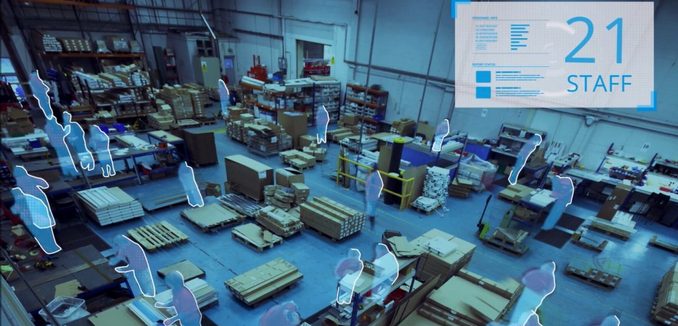How did an Israeli startup evolve from using radio frequency (RF) technology intended to detect breast cancer to creating palm-sized devices that can monitor passengers in self-driving cars? That’s the remarkable story of Vayyar Imaging, which is building a multi-purpose sensor with real-life uses that sound straight out of science fiction.
Vayyar’s three cofounders—Raviv Melamed, Miri Ratner and Naftali Chayat—discovered in 2011 that each had a family member suffering from cancer. They set out to make a difference. The product they built was a thumb-sized sensor with 24 built-in RF antennas.
RF signals can penetrate anything from human tissue to concrete walls. Because objects made of differing materials absorb the RF signals at varying rates, some signals go straight through an object while others bounce back at distinctive strengths, creating what Vayyar head of marketing Malcolm Berman describes as “a reflection.” Vayyar then uses its many antennas to stitch those reflections into a 3D image.
For breast cancer, Vayyar could be used to differentiate between normal tissue and a tumor, and between benign and malignant tumors.
Vayyar’s founders soon realized that the same technology could be used in almost unlimited applications—from smart homes to self-driving cars to milking cows. In the latter, Vayyar’s sensors can analyze the make-up of the milk and flag it if it’s not up to standards.
And while Vayyar generates precise 3D images, a sensor is not a camera, so Vayyar can’t identify a specific person. That can be beneficial for, say, a supermarket that wants to track consumer behavior while protecting shoppers’ privacy.
Vayyar’s director of business development Ian Podkamien shared with ISRAEL21c some of the areas Vayyar is now working on.
Elder care: Vayyar can monitor the movements of seniors in a care facility as well as at home. You’ll know if your loved one has fallen in the shower without installing a privacy-invading camera.
Gas stations: A Vayyar sensor can analyze the gasoline stored in the tank under a service station to determine if someone has added water (an unscrupulous way to maximize profits while reducing gas quality).
Production lines: Vayyar’s technology can ensure that human workers and robotic forklifts don’t run into each other, enhancing productivity and safety.
Smart home: Vayyar can monitor how many people are in a room and send that data to a home automation provider, such as Nest, which automatically adjusts air conditioning as people enter and leave the space.
Home improvement: Walabot, Vayyar’s first consumer product for do-it-yourselfers, can see through a wall and show you whether there are any pipes or wires where you’re about to drill. Released in 2016, Walabot’s YouTube video went viral with 45 million views.
Autonomous cars
“We are focusing on making as many markets as possible in parallel,” Podkamien told ISRAEL21c. “If someone wants to do something in a new market, that’s my job.”
Which brings us to self-driving cars. A single Vayyar sensor with its many antennas (the next chip will have 72, up from 24 today) can perform multiple functions, such as monitoring how many people are in the car, whether they’re wearing their seat belts, or if the driver has fallen asleep.
Isn’t the point of autonomous driving technology that you don’t need a human driver?
There are different levels of autonomous driving, Podkamien explained. While “Level 5” refers to fully self-driving cars, before we get to that point, “semi-autonomous” cars will be on the road and, in that case, someone needs to be awake at all times – just in case.
Even with Level 5 cars, monitoring will be important. What’s to stop 10-year-old Danny from swiping the keys from mom or dad, typing an address into the GPS unit in the car and taking off? A Vayyar sensor will instantly know that Danny isn’t big enough to drive and can alert his parents immediately.
If there is an accident with a self-driving car at any level, Vayyar’s RF sensors can determine the position and condition of any injured passengers and send that data to emergency responders for a head start on first aid.
Sensors can also monitor the area immediately surrounding a vehicle, removing blind spots. And because they’re not cameras, Vayyar’s sensors work even in the dark, fog and extreme weather.
Vayyar’s products are inexpensive (a single sensor can do multiple jobs with minimal weight and wiring), energy efficient (RF uses low power radio transmissions – important for the green cars of the future) and small (they can be embedded in a seat or hidden behind the dashboard).
Investors have pumped $32 million into the company in the last five years. Vayyar has 70 employees with headquarters in Yehud (near Ben-Gurion Airport) and a small team in Sweden.
With all that, the initial impetus behind the company is still there. According to Berman, Vayyar is doing in-vivo trials in Israel for the breast-cancer application and will be expanding to India next.
“Vayyar’s team is developing scientifically significant technology that is not only improving some companies’ bottom lines, but truly improving the quality of life for people worldwide,” said Scott Tobin, general partner at Battery Ventures, one of Vayyar’s key investors.
“Sensors are a growing area,” Podkamien says. “The trend in the industry is that everything needs to be connected and everything needs to be autonomous. That’s the vision of the Internet of Things.”
(via Israel21c)
[Photo: Israel21c]




